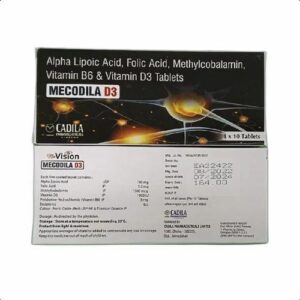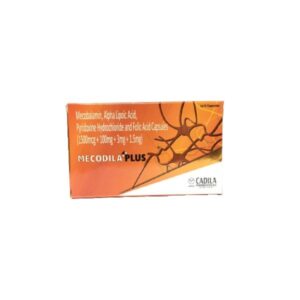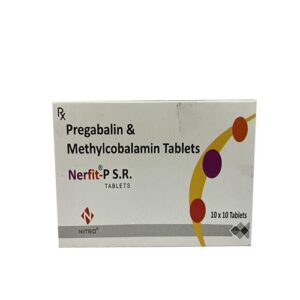FOLIC ACID + PYRIDOXINE (VITAMIN B6) + ALPHA LIPOIC ACID + MECOBALAMIN
Folic Acid: Folic acid is a synthetic form of folate, a B vitamin. It is primarily used as a supplement to prevent or treat a deficiency of folate, which can occur due to various factors such as poor diet, certain medical conditions, or medications that interfere with folate absorption.
Folic acid is essential for many bodily functions, including the production of red blood cells and the synthesis and repair of DNA. It is particularly important during periods of rapid cell division and growth, such as in pregnancy, infancy, and adolescence.
The recommended daily dose of folic acid varies depending on the purpose of use. For prevention of folate deficiency, the usual dose for adults is 400-800 micrograms per day. Pregnant women typically require higher doses, around 600-800 micrograms per day. However, always consult a healthcare professional to determine the appropriate dosage for individual needs.
Folic acid works by being converted into its active form, tetrahydrofolate, in the body. This active form is involved in various steps of DNA synthesis and methylation. By providing an adequate supply of folic acid, it helps prevent a deficiency and supports healthy cell growth and development.
While folic acid is generally considered safe, it can cause side effects in some individuals. Common side effects include nausea, loss of appetite, and stomach upset. In rare cases, allergic reactions such as rash or itching may occur. Extremely high doses of folic acid may mask a vitamin B12 deficiency or interact with certain medications, so it is important to follow recommended dosages and inform your healthcare provider of any other medications you are taking.
It is worth noting that folic acid supplementation is particularly important for women of childbearing age, as it can help reduce the risk of certain birth defects, such as spina bifida, when taken prior to and during early pregnancy. In such cases, higher doses of folic acid may be recommended by healthcare professionals.
Pyridoxine (vitamin B6): Pyridoxine, also known as vitamin B6, is a water-soluble vitamin that plays a crucial role in various bodily functions. It is essential for the metabolism of amino acids, carbohydrates, and lipids. Pyridoxine is available as a supplement and is also found naturally in certain foods.
Pyridoxine is primarily used to treat and prevent deficiencies of vitamin B6. It may also be prescribed to prevent and manage certain conditions such as premenstrual syndrome (PMS), morning sickness during pregnancy, and kidney stones. Additionally, it is sometimes used as an adjunct therapy in the treatment of seizures, autism, and certain types of anemia.
The exact mechanism of action of pyridoxine is not fully understood. It acts as a coenzyme in various metabolic pathways, assisting in the conversion of essential amino acids and helping to produce neurotransmitters such as serotonin, dopamine, and norepinephrine. This vitamin is also involved in the synthesis of hemoglobin and the proper functioning of the immune system.
The recommended dose of pyridoxine varies depending on the individual’s age, sex, and the specific condition being treated. Generally, the recommended daily allowance (RDA) for adults is around 1.3-1.7 mg. Higher doses may be prescribed by a healthcare professional for certain medical conditions.
Pyridoxine is generally considered safe when taken at recommended doses. However, higher doses may lead to side effects such as nausea, vomiting, stomach pain, loss of appetite, headache, and tingling sensations in the hands and feet (peripheral neuropathy). Long-term use of high doses can potentially cause nerve damage.
Pyridoxine may interact with certain medications such as levodopa, phenytoin, and some anti-seizure drugs. It is important to consult with a healthcare professional or pharmacist before taking pyridoxine along with other medications.
In summary, pyridoxine (vitamin B6) is an essential nutrient involved in numerous metabolic processes in the body. It is used to treat vitamin B6 deficiencies and to manage certain conditions. While generally safe, it is important to follow recommended dosages and consult with a healthcare professional for personalized guidance.
Alpha Lipoic Acid: Alpha Lipoic Acid (ALA) is a dietary supplement and antioxidant that plays a vital role in energy metabolism. It is often used as a complementary therapy for various health conditions. ALA is naturally produced in the body but can also be obtained from certain foods.
The primary use of Alpha Lipoic Acid is to treat diabetic neuropathy, a condition that causes nerve damage due to uncontrolled blood sugar levels. ALA helps reduce pain, numbness, and burning sensations associated with this condition. It is also used as a potential treatment for other conditions like metabolic syndrome, liver disease, and certain cognitive disorders.
The exact mechanism of action of ALA is still not fully understood. However, it is thought to work by acting as a potent antioxidant, protecting cells from damage caused by free radicals. ALA can also regenerate other antioxidants, such as vitamins C and E, allowing them to continue their cell-protective functions.
The recommended dose of Alpha Lipoic Acid varies depending on the condition being treated. For diabetic neuropathy, a common initial dose ranges from 600 to 1200 mg per day, divided into two or three doses. It is advisable to start with a lower dose and gradually increase it under medical supervision. ALA is available in capsule or tablet form and can be taken with or without food.
Overall, Alpha Lipoic Acid is considered safe for most people when taken in appropriate doses. However, it may cause mild side effects such as stomach upset, nausea, or a rash. In rare cases, it can cause low blood sugar levels, especially in individuals with diabetes. ALA may also interfere with certain medications or have interactions with other supplements, so it is important to consult with a healthcare professional before starting ALA supplementation.
Mecobalamin: Mecobalamin is a form of vitamin B12 that is used as a dietary supplement and as a treatment for certain medical conditions. It is commonly prescribed for the treatment of vitamin B12 deficiency, which can occur due to conditions such as pernicious anemia, malabsorption disorders, or dietary deficiencies.
The main function of Mecobalamin is to support the production of healthy red blood cells and to maintain proper nervous system function. It is essential for the synthesis of DNA and the maintenance of myelin, which is a protective sheath around nerve fibers. By ensuring these processes, Mecobalamin can help improve symptoms such as fatigue, weakness, numbness or tingling in the extremities, and poor concentration.
The usual daily oral dose of Mecobalamin for adults with vitamin B12 deficiency is around 1 to 2.5 milligrams. The exact dosage may vary depending on the severity of the deficiency and the individual’s response to treatment. Mecobalamin is also available as an injectable form, which may be used in cases where oral supplementation is not effective or feasible.
While Mecobalamin is generally considered safe, some individuals may experience side effects. Common side effects include nausea, vomiting, diarrhea, headache, and dizziness. These side effects are usually mild and transient, and they tend to resolve on their own. In some cases, high doses of Mecobalamin may cause skin rash or allergic reactions. If any adverse effects occur, it is important to consult a healthcare professional for further guidance.
Overall, Mecobalamin is an important vitamin B12 supplement that is used to treat deficiency and support proper nerve and blood cell function. It is available in various forms and dosages, and its use should be guided by a healthcare professional to ensure optimal results and safety.




